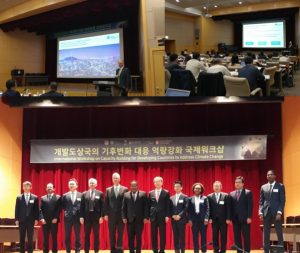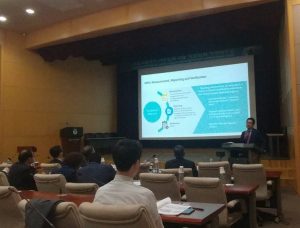 Dr. Frank Rijsberman, Director-General of GGGI and Mr. Chan-Ho Park, Director and Head of Programs of Large and Emerging Economies delivered presentations at the “International Workshop on Capacity Building for Developing Countries to Address Climate Change” on May 9 in Seoul.
Dr. Frank Rijsberman, Director-General of GGGI and Mr. Chan-Ho Park, Director and Head of Programs of Large and Emerging Economies delivered presentations at the “International Workshop on Capacity Building for Developing Countries to Address Climate Change” on May 9 in Seoul.
The conference was organized by the Center for Global Climate and Marine Governance of Korea University and hosted by GGGI, the UNDP Seoul Policy Center, the Green Asia Organization, the Center for Climate and Sustainable Development Law and Policy (CSDLAP), and the Institute of Environment and Ecology at Korea University.
The opening session kicked off with welcoming remarks by former Vice Minister of the Ministry of Foreign Affairs where he made references to the three pillars of climate change: confession, complement, and caveat, emphasizing the importance of capacity building going forward in the context of developing countries.
Congratulatory remarks were delivered by H. E. Shiferaw Jarso, Ambassador of Ethiopia to the Republic of Korea, where he highlighted the importance of capacity building in his country for climate resilience. Balázs Horváth, Director of the UNDEP Seoul Policy Centre, also gave congratulatory remarks highlighting how the impact of climate change affects marginalized, vulnerable groups and reiterating the fact that there is an urgent need for the world to pay closer attention to carbon financing and sustainable infrastructure in the face of energy subsidies for fossil fuels and electricity generation investment in non-renewables.
The keynote speech was delivered by Dr. Frank Rijsberman, Director-General of GGGI, on the “Role of GGGI in Addressing Climate Change in Developing Countries: A case of Ethiopia.” Dr. Rijsberman began his presentation, pointing to the urgent need for improving air quality in Asia and outlining the importance of GGGI’s vision and mission of green growth. He said that GGGI played a key role in developing Ethiopia’s Climate-Resilient Green Economy (CRGE) Facility’s Operational Manual, Monitoring & Evaluation Systems, and Fast-Track Investment guidelines and priorities that led to the Facility’s mobilization and subsequent disbursement.
The main session of the workshop, titled “Issues of Enhancing Capacity for Developing Countries in Addressing Climate,” began with Professor Chung and “Global Climate Change Regime and Low Carbon Development.” The new climate change regime from Article 6 of the Paris Agreement with a bottom-up approach with NDCs was mentioned. Professor Chung’s expertise with global climate change governance with UNFCCC, G20, GCF, and GGGI was discussed and the importance of developing countries’ role and financing from both public and private sectors was highlighted. Professor Suh-Yong Chung of Korea University took the lead role in organizing the international workshop on capacity building as he currently directs the Center for Global Climate and Marine Governance at KU and CSDLAP. Furthermore, he has previously served on GGGI’s Council as an expert and non-state actor, being nominated and appointed by the Council.
 Mr. Chan-Ho Park, Director and Head of Programs of Large and Emerging Economies highlighted MRV’s role in enhancing capacity for transparency mechanism in Paris Agreement. He elaborated MRV as a tool to promote effective green growth actions, and how the GGGI’s MRV program is designed to provide technical support on GHG MRV establishment and strengthening the MRV capacities. Explanations of GGGI’s MRV program in Uganda, Myanmar, Lao PDR, and Ethiopia were presented to showcase GGGI’s MRV Capacity Building Program.
Mr. Chan-Ho Park, Director and Head of Programs of Large and Emerging Economies highlighted MRV’s role in enhancing capacity for transparency mechanism in Paris Agreement. He elaborated MRV as a tool to promote effective green growth actions, and how the GGGI’s MRV program is designed to provide technical support on GHG MRV establishment and strengthening the MRV capacities. Explanations of GGGI’s MRV program in Uganda, Myanmar, Lao PDR, and Ethiopia were presented to showcase GGGI’s MRV Capacity Building Program.
From the private sector, Dong-Kyun Park who is an independent Consultant on Forest and Climate Change and Byung-il Jang who is the team leader for International Development Assistance, Samil Price Water Coopers Sustainability and Climate Change Services presented. Mr. Park connected climate change to carbon markets and the REDD+ Framework, addressing challenges and outstanding issues in REDD+. Mr. Jang explained Samil PwC’s IDA consulting services and GCF projects, funding, and lessons learned from projects in DR Congo, Ecuador, and Morocco.
Lastly a discussion was held with KOICA and PhD students at KU to further discuss capacity building in developing countries. Mr. Mazhar Hayat of the Ministry of Climate Change of Pakistan, Ms. Mareledi Gina Maswabi of the Ministry of Mineral Resources, Green Technology and Energy Security of Botswana, and Mr. Habtamu Alamayo Farada of the Minstry of Finance and Economic Cooperation of Ethiopia gave insights of factors to consider in capacity building and the role intergovernmental organizations can play in collaboration with governments and private stakeholders.